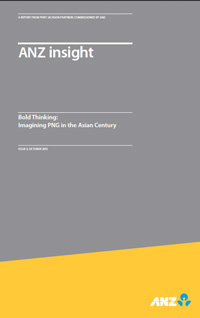While its bullish prediction of US$23 billion in annual export earnings for Papua New Guinea by 2030 may have garnered the headlines, there’s a lot more to ANZ’s ‘Bold Thinking: Imagining PNG in the Asian Century’ report, released this week.
 While many of the issues canvassed will be all too familiar, ANZ is respectfully hoping to contribute to a ‘national conversation’ on how many of these issues can actually be fixed. In brief, here are eight of several ideas suggested by the report.
While many of the issues canvassed will be all too familiar, ANZ is respectfully hoping to contribute to a ‘national conversation’ on how many of these issues can actually be fixed. In brief, here are eight of several ideas suggested by the report.
1. Use the private sector
With many of PNG government bodies suffering from ‘institutional weakness’, the report argues that the Government should embrace the use of the private sector for the delivery of services.
2. Privatise state enterprises
‘The benefit of privatising government businesses has been demonstrated globally,’ argues the report.
3. Reform land laws
Existing land laws need to be revised to make it easier to free up more land for commercial use, especially in agriculture.
4. Spend the gas dollars on developing infrastructure
The report identifies agriculture as the big driver of PNG’s long-term economic growth. With a lack of infrastructure holding back its development, the report argues: ‘It is important that steps are taken now to develop this sector while profits made in the resources sector can fund infrastructure, tax receipts and national savings’. The report also argues that improved infrastructure will be a major factor is getting the current crop of resources projects up and running.
5. PNG needs an Infrastructure Development Authority
The report notes the benefits of ‘rigorous cost-benefit analysis’ of infrastructure projects. An Infrastructure Development Authority, already on the drawing boards with help of the Australian Government, would ensure that infrastructure dollars were spent wisely and in the national interest.
6. Look to Africa
While the report notes that ‘no single country’s experience can provide a path to prosperity’, African countries like Botswana and Ghana can offer ‘inspiration’. Notably, the report singles out some of the factors in their success: ‘privatising SOEs, reducing trade barriers, cutting corporate taxes and strengthening regulatory and legal systems’.
7. Encourage sharing of infrastructure
Incentives are required to encourage sharing, and remove unnecessary duplication, of infrastructure such as electricity generation, training, accommodation and transport.
8. Strengthen institutions and address corruption
‘The difference between resource-rich countries experiencing high and low growth is explained by the quality of each country’s institutions,’ notes the report. ‘Strong political will combined with powerful institutions and zero tolerance, backed up by independent prosecutions, have been central to reduced corruption.’
What do you think?
Have you read the full report? What do you think of the issues it canvasses and the suggestions it makes? Share your thoughts in the comments section below.









Speak Your Mind